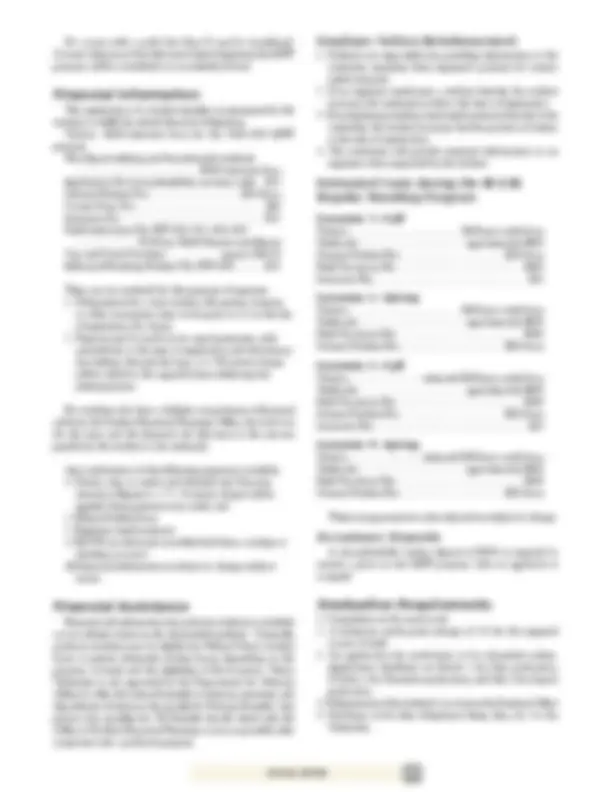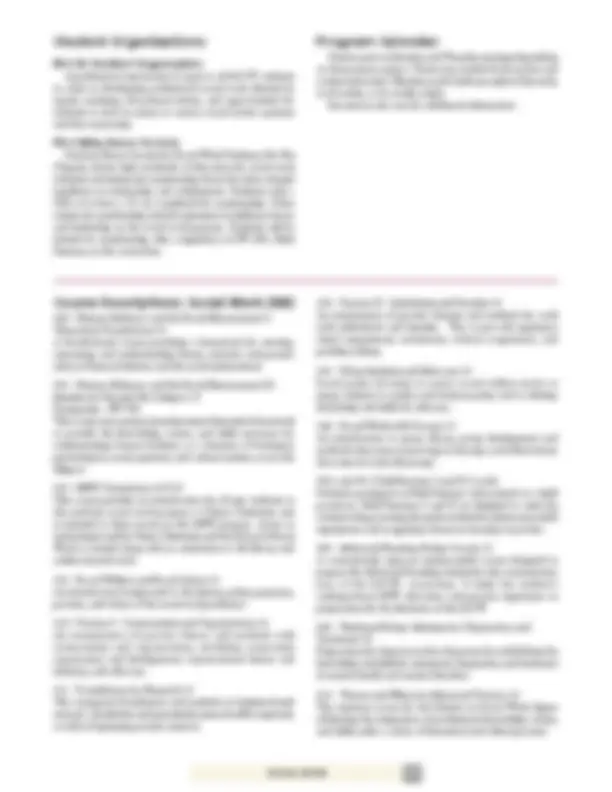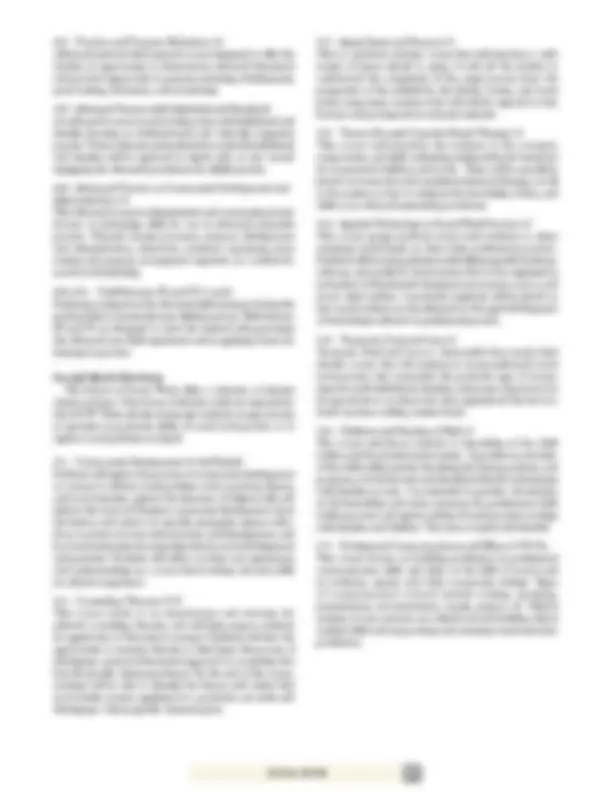





Study with the several resources on Docsity

Earn points by helping other students or get them with a premium plan


Prepare for your exams
Study with the several resources on Docsity

Earn points to download
Earn points by helping other students or get them with a premium plan
Community
Ask the community for help and clear up your study doubts
Discover the best universities in your country according to Docsity users
Free resources
Download our free guides on studying techniques, anxiety management strategies, and thesis advice from Docsity tutors
The requirements for the Advanced Standing option in a Master of Social Work (MSW) program. Students can complete the program in one or two years and must earn a minimum of 33 semester hours of approved graduate work. The program includes required core courses, field practicum hours, and electives in Social Work and related fields. Students in the dual MSW/MCS program have additional requirements. The document also provides information on admissions, financial assistance, and student organizations.
Typology: Summaries
1 / 6

This page cannot be seen from the preview
Don't miss anything!




The MSW Program accepts students beginning in the fall semester. Students entering with a degree other than the BSW must complete 60 credit hours to complete the program. Qualified applicants with the BSW may be eligible for the Advanced Standing program, which requires 33 hours to complete the MSW. Qualifications include graduation with the BSW from a CSWE-accredited program, a GPA of at least 3.0, completed application, and references that meet the standards of the MSW Admissions Committee. (More information appears below.) This degree is not offered in a totally online format; however, most courses have online components, and some courses are totally online. For more information, visit www.uu.edu/msw/.
The M.S.W. program is accredited by the Council on Social Work Education (CSWE).
Admission to the program will be based on competitive selection from the pool of applicants who meet the following admission requirements:
A student with a B.S.W. degree from a CSWE-accredited undergraduate program may apply for admission to the Advanced Standing Program. Requirements for admission include:
A minimum of 60 semester hours of approved graduate work is required for completion of the Regular Standing program. This can be completed in a two year or a three year option. In addition, each student will complete a total of 900 clock hours of field practicum I. Required Core: 51 hours A. SW 502 MSW Orientation B. SW 500 Human Behavior and the Social Environment I C. SW 501 Human Behavior and the Social Environment II D. SW 510 Social Welfare and Social Justice E. SW 520 Practice I: Communities and Organizations F. SW 521 Foundations for Research G. SW 530 Practice II: Individuals and Families H. SW 535 Policy Analysis and Advocacy I. SW 540 Social Work with Groups
J. SW 590 Field Seminar I K. SW 591 Field Seminar II L. SW 605 Psychopathology M. SW 623 Theory and Ethics for Advanced Practice N. SW 631 Practice and Program Evaluation O. SW 650 Advanced Practice with Individuals and Families P. SW 660 Advanced Practice in Community Development and Administration Q. SW 690 Field Seminar III R. SW 691 Field Seminar IV II. Electives: 9 hours
MSW/MCS: A dual degree option is offered between the School of Social Work and the School of Theology and Missions. Students will complete the required social work courses from Advanced Standing (24 hours) or Regular Standing (51 hours), the required Christian studies courses ( hours), and an additional 12 hours of electives. 6 0-hour option: I. Required Social Work Core from Advanced Standing—24 hours: II. Required Christian Studies Courses—24 hours: MCS 500, 505, 510, 515, 517, 538, 545, 546 III.Four Electives from the following (2 from each discipline)—12 hours: A.SW: 522, 523, 524, 525, 526, 550, 551, 552, 553, 554, 555, 556, 557, 558, 610, 611, 612 B. MCS: 516, 520, 535, 536 C. SW/MSC 580 Study Abroad (Communities and Trauma) SW/MCS 580 Study Abroad (Poverty) 87-hour option: I. Required Social Work Core from Regular Standing— hours: II. Required Christian Studies Courses—24 hours: MCS 500, 505, 510, 515, 517, 538, 545, 546 III.Four Electives from the following (2 from each discipline)—12 hours: A.SW: 522, 523, 524, 525, 526, 550, 551, 552, 553, 554, 555, 556, 557, 558, 610, 611, 612 B. MCS: 516, 520, 535, 536 C. SW/MSC 580 Study Abroad (Communities and Trauma) SW/MCS 580 Study Abroad (Poverty) Admissions Requirements: Applicants to the MSW/MCS dual degree must apply to and be accepted to each program separately, per current admission requirements of each program. MSW/MBA: A dual degree option is offered between the School of Social Work and the McAfee School of Business. Students will complete the required social work courses from Advanced Standing (24 hours) or Regular Standing (51 hours), and the required Masters of Business courses (24 hours.), and an additional 12 hours. of MSW courses which are counted as MBA electives. Admissions Requirements: Acceptance to the MSW/MBA dual degree program is gained through the MSW admissions process. If applying to the MSW first, the GRE/GMAT for the MBA is waived. MBA 602 may be required as a prerequisite for the dual degree.
Applicants who do not meet the regular admission requirements for the MSW program may be admitted provisionally at the discretion of the MSW Admissions Committee. Provisional admission will require contractual agreement between the applicant and the Admissions Committee to specify the conditions that must be met to matriculate into the MSW program without the designation of provisional status.
Graduate credit for courses earned at a regionally accredited university and in a CSWE-accredited MSW program may be transferred to Union University if the courses are essentially the same as those required in the MSW program. Evidence of similarity may be requested by presenting course descriptions or a syllabus from the institution where the course was taken. Such transfer credit will not be allowed for courses used to satisfy another degree at another institution. The maximum number of semester hours that may be transferred to Union University and applied to the MSW degree is nine hours, unless extenuating circumstances are presented such as to require special faculty approval otherwise.
M.S.W. Student Organization A professional organization is open to all M.S.W. students to assist in developing professional social work identity by regular meetings, educational events, and opportunities for students to lead in service to various social service agencies and the community. Phi Alpha Honor Society National Honor Society for Social Work Students, Eta Phi Chapter, fosters high standards of education for social work students and invites into membership those who have attained excellence in scholarship and achievement. Students with a GPA of at least a 3.8 are considered for membership. Other criteria for membership include experience in field practicum and leadership in the social work program. Students will be invited for membership after completion of SW 690, Field Seminar, in the curriculum.
Classes meet on Monday and Thursday evenings depending on the program option. Classes may include both in-class and on-line instruction. Electives may be held any night of the week, on Saturday, or be totally online. See www.uu.edu/msw for additional information.
500. Human Behavior and the Social Environment I: Theoretical Foundations (3) A foundational course providing a framework for creating, organizing, and understanding theory, research, and practice issues of human behavior and the social environment. 501. Human Behavior and the Social Environment II: Assessment through the Lifespan (3) Prerequisite: SW 500. This course uses a person-in-environment theoretical framework to provide the knowledge, values, and skills necessary for understanding human behavior as a function of biological, psychological, social, spiritual, and cultural systems across the lifespan. 502. MSW Orientation (0) F, S This course provides an introduction for all new students to the graduate social work program at Union University and is essential to their success in the MSW program. Access to technologies used by Union University and the School of Social Work is covered along with an orientation to the library and online research tools. 510. Social Welfare and Social Justice (3) An introductory background to the history, policy, programs, practice, and values of the social work profession. 520. Practice I: Communities and Organizations (3) An examination of practice theory and methods with communities and organizations, including community organization and development, organizational theory and behavior, and advocacy. 521. Foundations for Research (3) The conceptual foundations and methods of evidence-based research. Qualitative and quantitative research will be explored, as well as beginning practice research. 530. Practice II: Individuals and Families (3) An examination of practice theories and methods for work with individuals and families. The course will emphasize client engagement, assessment, cultural competence, and problem-solving. 535. Policy Analysis and Advocacy (3) Social policy focusing on major social welfare issues to equip students to analyze and evaluate policy and to develop knowledge and skills for advocacy. 540. Social Work with Groups (3) An introduction to group theory, group development and methods of practice, various types of groups, and ethical issues that arise in work with groups. 590. and 591. Field Seminar I and II (3 each) Students participate in Field Seminar when placed in a field practicum. Field Seminars I and II are designed to assist the student with processing the graduate level foundation year field experiences and in applying classroom learning to practice. 599. Advanced Standing Bridge Course (3) A concentrated, rigorous seminar-styled course designed to prepare the Advanced Standing student for the concentration year of the M.S.W. curriculum. It links the student’s undergraduate BSW education and practice experience in preparation for the final year of the M.S.W. 605. Psychopathology: Assessment, Diagnostics, and Treatment (3) Preparation for clinical social work practice by establishing the knowledge and skills for assessment, diagnostics, and treatment in mental health and mental disorders. 623. Theory and Ethics for Advanced Practice (3) The capstone course for the Masters in Social Work degree addressing the integration of professional knowledge, values, and skills under a rubric of theoretical and ethical practice.
631. Practice and Program Evaluation (3) Advanced graduate level research course designed to offer the student an opportunity to demonstrate advanced theoretical and practical approaches to program planning, development, grant writing, evaluation, and monitoring. 650. Advanced Practice with Individuals and Families (3) An advanced course in social work practice with individuals and families focusing on evidence-based and culturally competent practice. Various theories and methods for work with individuals and families will be explored in depth with an aim toward equipping the advanced practitioner for skilled practice. 660. Advanced Practice in Community Development and Administration (3) This advanced course in administrative and community practice focuses on leadership skills for use in advanced generalist practice. Planned change processes, program development and administration, teamwork, consensus organizing, grant writing and program management expertise are contexts for social work leadership. 690, 691. Field Seminar III and IV (3 each) Students participate in the advanced field seminars during the graduate level concentration year field practicum. Field seminar III and IV are designed to assist the student with processing the advanced year field experiences and in applying classroom learning to practice. Social Work Electives The School of Social Work offers a selection of elective classes each year. Nine hours of elective credit are required for the M.S.W. These elective classes give students an opportunity to specialize in particular fields of social work practice or to explore social problems in depth. 511. Community Development (3) As Needed Students will explore the practice of community development as a means to address social problems such as poverty, disease, and social injustice; explore the dynamics of religious life and faith in the work of Christian community development; learn the history and culture of a specific geographic region, with a focus on issues of cross-cultural service and development, and local and international sociopolitical factors in its development and poverties. Students will reflect on their own experiences and understandings in a cross-cultural setting and gain skills in cultural competence. 512. Counseling Theories (3) F This course serves as an introduction and overview for selected counseling theories and will help prepare students for application of theoretical concepts. Students will have the opportunity to examine theories as they begin the process of developing a personal theoretical approach to counseling that best fits specific client populations. By the end of the course, students will be able to identify the theory with which they most closely connect, applying it to a particular case study and developing a theory-specific treatment plan. 522. Aging Issues and Services (3) This is a graduate overview course that will introduce a wide variety of issues related to aging. It will aid the student to understand the complexity of the aging process from the perspective of the individual, the family, society, and social policy using senior mentors who will attend, respond to class lectures and participated in role play exercises. 523. Trauma-Focused Cognitive Based Therapy (3) This course will introduce the students to the concepts, components, and skills underlying evidenced-based treatment for traumatized children and youth. There will be specificity placed on trauma-focused cognitive behavioral therapy, as well as focus given on how to integrate the knowledge, values, and skills as an advanced generalist practitioner. 524. Applied Technology in Social Work Practice (3) This course equips graduate social work students to utilize emerging technologies in their daily professional practice. Students will become proficient in identifying specific hardware, software, and mobile & cloud services that can be employed in each phase of the planned change process in micro, mezzo, and macro client systems. A particular emphasis will be placed on how social workers can stay informed on the rapid development of technologies relevant to professional practice. 525. Traumatic Grief and Loss (3) Traumatic Grief and Loss is a three-credit hour master level elective course that will underscore trauma-informed social work practice that transcends the particular type of trauma exposure with individuals, families, and groups of persons, but has special focus on those who have experienced the loss of a loved one from sudden, violent death. 526. Children and Families at Risk (3) The course introduces students to knowledge of the child welfare and the juvenile justice system. It provides an overview of the child welfare system describing the history, policies, and programs, at both the state and the federal level for intervening with families in crisis. It is intended to provide a foundation in the knowledge and values necessary for professional child welfare practice and explore evidence based practices working with families and children. The class is taught web blended. 527. Professional Communications and Ethics (3) W, Su This course focuses on building proficiency in professional communication skills and ethics in the field of social work in academic, agency, and other community settings. Types of communication covered include writing, speaking, presentations, documentation, emails, memos, etc. Ethical analysis of case scenarios are utilized in both building ethical analysis skills and in practicing and assessing communication proficiency.